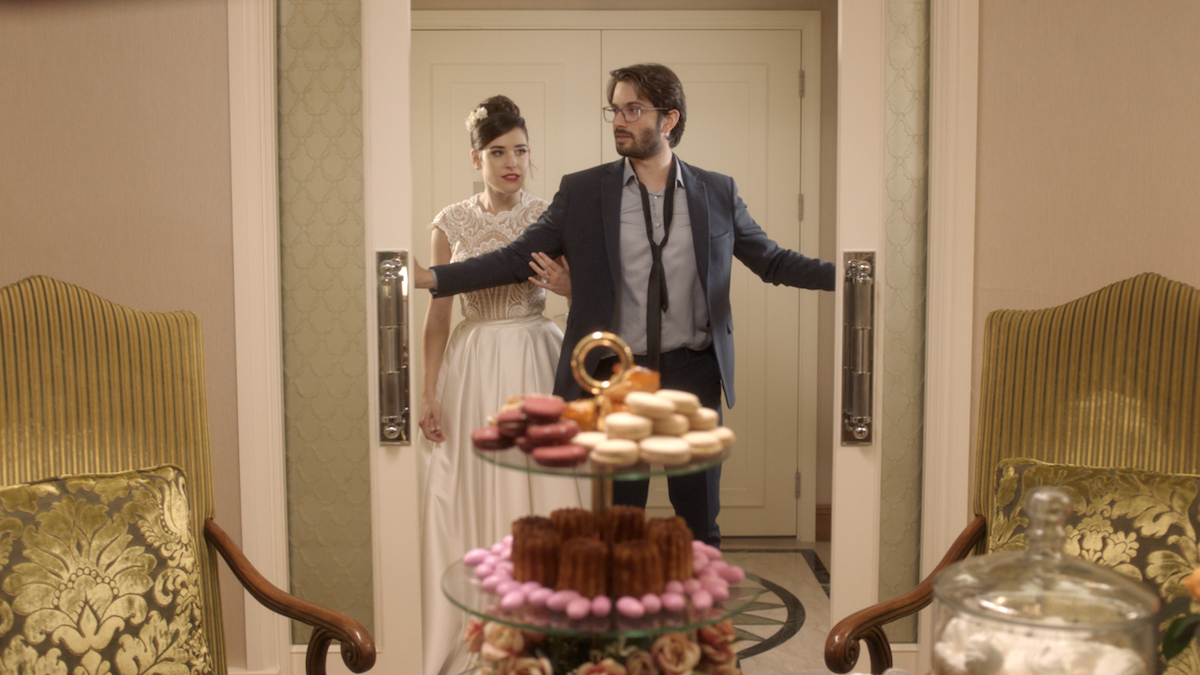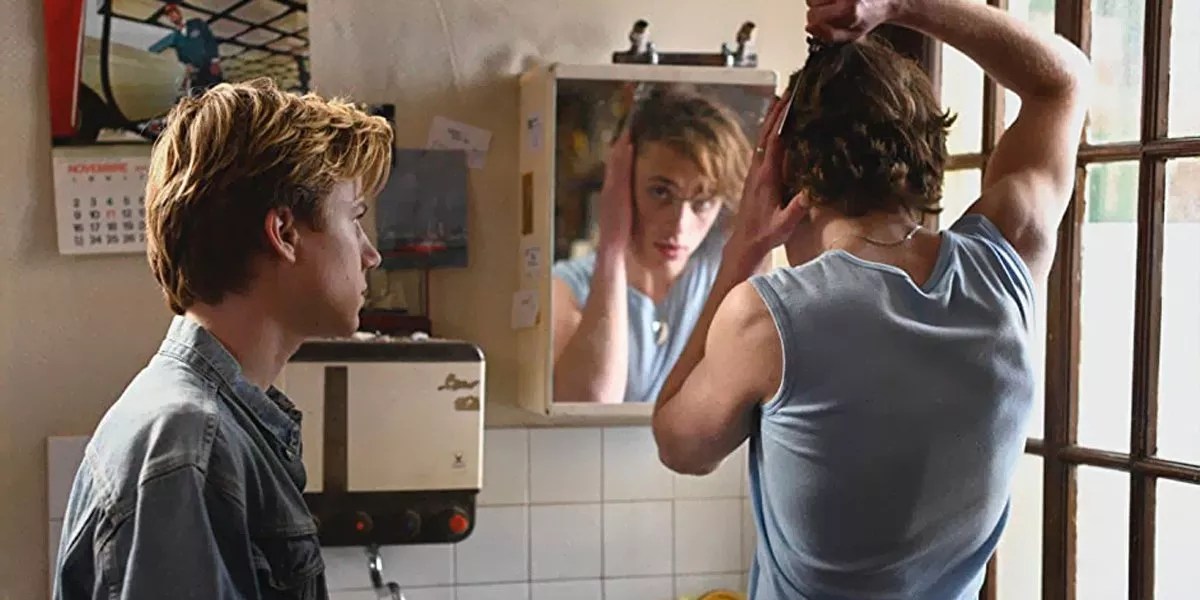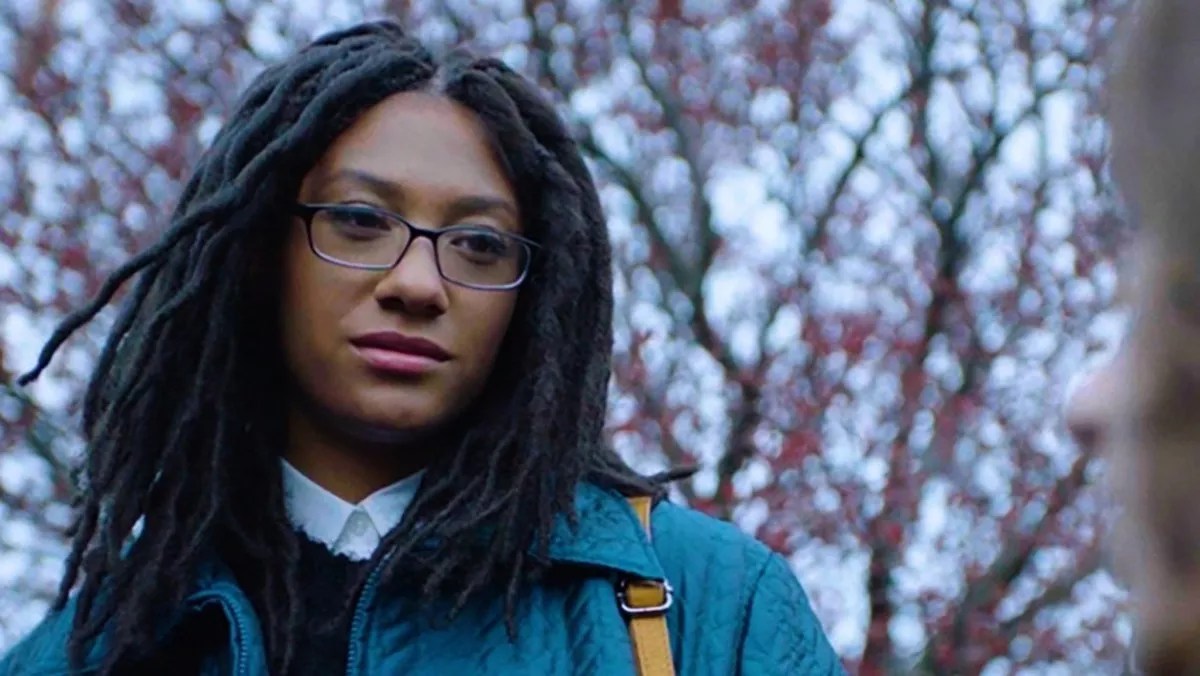
Photo courtesy of the Miami Jewish Film Festival

Audio By Carbonatix
Despite the challenges it faced over the past year, the Miami Jewish Film Festival returns this week with its largest and most ambitious program ever. While much of 2020 has been defined by isolation and social distance, the festival has placed accessibility above all else. The 24th edition includes virtual screenings, drive-ins, and in-person outdoor viewings, allowing for multiple entry points. Moreover, festival organizers have gone great lengths to offer all of this year’s content free of charge, eliminating any barrier to discovering the latest and best contemporary Jewish cinema. With more than 100 films screening over the next two weeks (April 14-29), there’s plenty of time to find your favorites.
Here are five films to enjoy during this year’s Miami Jewish Film Festival.
Honeymood
Talya Lavie’s Honeymood is precisely the kind of charming take on marriage we need more of these days. Its inciting incident is a simple one: In their honeymoon suite, Eleanor (Avigail Harari) and Noam (Ran Danker) find themselves fighting over a letter and a ring given to Noam by his ex-girlfriend as a gift. What starts as a journey to return the ring quickly devolves into a series of absurdities.
This year, make your gift count –
Invest in local news that matters.
Our work is funded by readers like you who make voluntary gifts because they value our work and want to see it continue. Make a contribution today to help us reach our $30,000 goal!
Lavie’s capable leads are forced to reckon with everything from elaborate dance sequences to suicidal nurses, and the director impressively manages the tone of the film throughout. It’s not just aiming for humor, though it does have plenty, but maintains a consistent undertone of sincere concern for the strain placed on the characters’ new marriage. Lavie pokes fun at the perils that come with a quick marriage, at leaving arguments unfinished (both with your spouse and with those you’ve loved before), and at the way we are expected to perform in marriage.
Honeymood‘s whimsical approach to so much of what it does isn’t too far a stretch from the way Lavie poked fun at how ridiculous being a grunt for the Israeli Defense Force could be. Her interest seems to be at dissecting rigid establishments and showing how nonsensical many of the rules that come with them can be. Marriage comes with more baggage than one expects, and one can’t help but smile when they watch someone else suffering through all that entails. 7:30 p.m. Wednesday, April 14, at the North Beach Bandshell, 7275 Collins Ave., Miami Beach. Tickets are sold out; visit miamijewishfilmfestival.org to be put on the waitlist. Juan Antonio Barquin

Photo courtesy of the Miami Jewish Film Festival
Isaac
If you want kinetic cinema, look no further than Isaac, the debut feature from Lithuanian filmmaker Jurgis Matulevicius. Exhilarating, moody, and mysterious, Isaac is a tour de force where it feels as if anything could happen. The film perfectly marries a brooding often associated with Eastern European cinema with the freshness and excitement that recalls the reckless energy of 1960s new-wave cinema. Isaac is a live wire – unpredictable, dangerous, and high voltage.
The film opens with a harrowing and virtuosic six-minute single shot that depicts the Lietukis Garage Massacre of 1941, in which Lithuanian nationalists tortured and murdered more than 50 Jewish men. The horrific event haunts the remaining film, as Isaac deals with the aftershocks of the massacre 20 years later. Gediminas Gutauskas (Dainius Gavenonis), a filmmaker, has returned home after two decades away, eager to start production on his latest film, a retelling of the massacre. His homecoming is tempered by his reunion with Andrius (Aleksas Kazanavicius), who remained in Lithuania throughout the war and is struggling to process his own trauma and actions, and a KGB agent intent on reopening an investigation into the massacre prompted by the suspicious accuracy of Gediminas’ script. In addition, Elena (Severija Janusauskaite), Andrius’s wife, starts working on the film, and a sort of love triangle develops.
Admittedly, it is easy to get lost from time to time in the plot twists, and Matulevicius leaves some narrative threads hanging loose. But the film’s surreal stream of consciousness, infused from its source material by Antanas Skema, is one of its most exciting elements. What develops is a meta-murder mystery that explores shame, guilt, and trauma in an exquisite way. Matulevicius favors pure cinema over exposition. The visual language, defined by an immersive unchained camera with extended takes coupled with a modern and anachronistic sound design, breaks free of the restrictive period film dynamic and produces something timeless and universal. The final image of Isaac is haunting and captures a generation of lost souls who find themselves in a new world order defined by corrupted morality. These are people who are eager to forget what cannot be forgotten, people whose future is anchored by the past. Screening virtually April 14-29. Trae DeLellis

Photo courtesy of the Miami Jewish Film Festival
Kenny Scharf: When Worlds Collide
Kenny Scharf: When Worlds Collide opens with the artist describing his process. The words are not particularly poignant, insightful, or articulate, but this serves as a testament to the documentary’s success. What follows Scharf’s words is a wonderfully intimate, informative, and compelling examination of the evolution and survival of Kenny Scharf. Filmmakers Malia Scharf and Max Basch artfully externalize their subject’s intuitive process cinematically for the audience to appreciate.
Documentaries in which the makers and the subject are too close (in this case, daughter and father) often raise a red flag. Is objectivity compromised? Happily, this film is a welcome exception. The close connection between the Scharfs creates intimacy and access to the artist’s work and personal artifacts that guide this film. The directors organize the cornucopia of materials in a what that complements and enhances Scharf’s work, and the pace of the editing matches the artist’s hyperactive creative process. The filmmakers expertly chart the artist’s life from his outsider childhood in the San Fernando Valley to the height of the 1980s New York art scene where he reinvented himself and his return to Los Angeles as he preserves as a working artist and everywhere in between. For fans of the artist-documentary subgenre, When Worlds Collide stands out for the way it explores how an artist develops, struggles, and evolves over a 40-plus-year career.
The film does what all great documentaries about creative people do: It balances the genius and the human. The filmmakers capture the highs and lows of Scharf’s life, and the artist provides candid and self-aware commentary to his work and life. The film’s highlight concerns Scharf’s prominence in the 1980s East Village art scene and his friendship and jealousy with contemporaries like Keith Haring and Jean-Michel Basquiat. The directors wonderfully explore how success, money, and celebrity altered that generation of artists and how hard drugs and the AIDS epidemic decimated the movement.
This passage reveals Scharf’s position as a kind of outlier, a survivor. Unlike Haring and Basquiat, he continues to work; his legacy has yet to be written. While many dismiss Scharf’s work as cartoonish and kooky, this documentary makes a strong argument about his serious commentary on contemporary culture. Regardless of whether Scharf’s work is to your personal taste, the documentary’s greatest achievement is that you can still appreciate the art and the artist. When Worlds Collide is a tribute to the endurance and evolution of an artist, so much so that it may have been titled A Portrait of the Artist as a Young Man… and as an older man. Screening virtually April 14-29. Trae DeLellis

Photo courtesy of the Miami Jewish Film Festival
Summer of 85
With his 20th feature in nearly as many years, François Ozon remains one of contemporary cinema’s most astonishing and underrated filmmakers. Ozon’s latest is a sun-soaked and tragic tale of first love, a chameleon of tone and genre, playfully subverting notions of identity and sexuality throughout his body of work. Adapted from Aidan Chambers’ young-adult novel Dance on My Grave, a text revered for the early adoption of positive gay themes in 1982, Summer of 85 continues a superb streak in Ozon’s oeuvre as a master filmmaker.
While there will be surface comparisons to Call Me By Your Name, Ozon’s film offers a greater narrative complexity as it weaves a seaside summer romance with a dark and desolate aftermath akin to film noir. One thing is clear from the moment the protagonist breaks the fourth wall in the introduction: Ozon is a filmmaker in complete control, and his enthralled spectator is strapped in for the ride.
The technical elements are topnotch. The continuity of the editing as the tale shifts from past to present, the contrast in the cinematography, great attention to costuming, and some tremendous use of music and sound design – all are admirable elements. The two young leads, Felix Lefebvre and Benjamin Voisin, capture the clumsiness and ecstasy of first love with the ease of a summer breeze. It would be criminal not to single out the scene-stealing performance by frequent Ozon collaborator Valerie Bruni Tedeschi as a kooky and comically invasive mother with the best of intentions. After you finish this delightful film, make sure you seek out more of Ozon’s work; like Almodóvar and Fassbinder, he is one of the most striking auteurs working in queer cinema. Summer of 85 earned an astounding 12 César nominations (the French equivalent of the Academy Awards). Screening virtually April 14-29. Trae DeLellis

Photo courtesy of the Miami Jewish Film Festival
Tahara
Tahara is an awkward movie, and depending on the type of viewer you are, this will either appeal to you greatly or turn you off from the get-go. Every fiber of its being seems designed to isolate the viewer. Still, there’s something altogether fascinating about the way director Olivia Peace emphasizes how the protagonists at its core are unable to navigate even the most basic situations.
Peace’s film, which bringing to life a script from Jess Zeidman, is a low-stakes endeavor. It’s a slice-of-life story about two young women (played by Madeline Grey DeFreece and Rachel Sennott) present at the funeral of a classmate who committed suicide, trying to deal with the overwhelming angst that surrounds them. They and their classmates all engage in the same kind of performative behavior that many high-school individuals, mourning the loss of someone they barely knew, act out in this sort of situation. It’s all a game to see who cared the most when the reality is that they’re all lost in their own insecurities and vices. This also extends to all of the actors’ performances, which seem intentionally heightened to emphasize how absurd teenage drama can be.
The way Peace and cinematographer Tehillah De Castro frame the film, in an efficient, boxy aspect ratio, works wonders for emphasizing the inability of these characters to escape their own bullshit. Their anxieties and fantasies come to life on screen via animation, sometimes stop-motion, sometimes literally drawn, in some of the film’s best sequences. Even smaller moments, like a conversation, told through eye movements and vague gestures while in temple with subtitles filling in the gaps in conversation, are a great example of how Tahara flourishes when it leans into the experimental.
Inevitably, though, much of its duration feels exhausting in its pacing and tone. The humor is too subtle for its own good, and despite a script with plenty of ideas to explore – especially when it comes to queerness and coming of age – the film never truly commits to breaking down what these things mean to either of these young women or grants them as much interiority as they deserve. As rough as Tahara may be around the edges, however, there’s enough here to admire and to make one curious as to what will come next from everyone involved in its making. Screening virtually from April 14-29. Juan Antonio Barquin